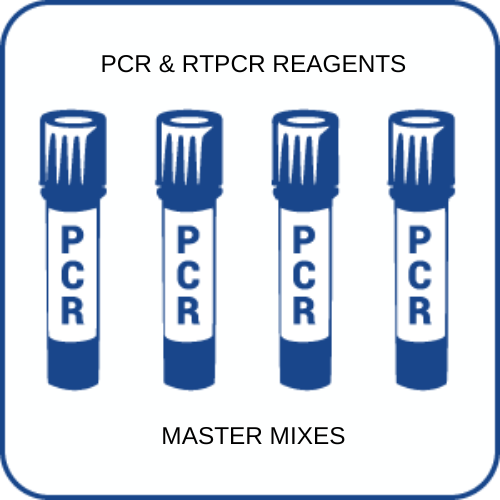Description
| Catalog No. | Specification | SYBR Green PCR SuperMix | 50x ROX Dye | RNase-Free
ddH2O |
Storage/Shelf life |
| 100EQ | 20μL×500 rxns | 4 x 1.25mL | 1mL | 4 x 1.25mL | -20℃/one year |
Advantage
1) Quickly get results, saving up to 50% of the time
2) Optimized ready-to-use master mix for rapid PCR reactions
3) Accurate detection of various starting amounts of templates, stable amplification, quantitative results with high repeatability
4) Balanced K+ and NH4+ ion ratios, as well as stand-alone ROX Reference Dye packagingforall real-time PCR instruments
Introduction
SYBR Green PCR SuperMix is an optimized 2x real-time PCR master mix containingHotStarTaq DNA Polymerase, SYBR Green® fluorescent dye, dNTP and Mg 2+ . In addition, thebalanced K + and NH4 + ion ratios in the buffer promote specific primer annealing. To ensureahighlysensitive and specific PCR reaction, the reaction can be initiated by simply adding theprimerandcDNA template to the ready-to-use PCR master mix. The unique PCR buffer ensures sensitiveqPCRon all real-time PCR instruments without optimization.
Kit Components
| Component | Character | Advantage |
|
HotStarTaq DNA Polymerase |
Heating at the pre-denaturation temperature for 30s will completely inactivate the blocking antibody and
release the DNA polymerase activity. |
Effectively suppresses non-specific amplification caused by primer annealing |
|
SYBR Green qPCR Buffer |
Suitable for all real-time PCR instruments |
qPCR run time is reduced by 50%, results are obtained faster, and more PCR reactions can be completed in one
day |
|
SYBR Green I dye |
Strong fluorescence signal when combined with DNA duplex |
High sensitivity amplification. It provides a wide-area linear range with a Ct value of 5-35 and a high sensitivity for single-digit copy detection, and is
suitable for melting curve analysis. |
|
ROX dye |
Calibration of fluorescent signals on ABI and Agilent PCR machines |
Calibration of PCR machines that
require ROX dyes does not affect PCR reaction results |
Kit principle
SYBR Green PCR SuperMix provides a wide range of specific, sensitive assays for standard and rapid PCR machines. The SYBR Green I dye in the master mix can analyze multiple target nucleic acids without the need to synthesize sequence-specific probes. The special fast PCR buffer can greatly shorten the denaturation, annealing and extension time, and has good applicability to complex templates, templates with more PCR inhibitor residues (such as soil and fecal DNA),and long-range amplification. In addition,HotStarTaq DNA Polymerase can be activated by heating at 95℃ for 30sec,requiring a strict hot start to avoid nonspecific products.
Kit application
SYBR Green PCR SuperMix Can be used for gene expression analysis of cDNA, plasmids, gDNA,absolute quantitative analysis. It is suitable for various real-time PCR machines, including ABI, Bio-Rad, Eppendorf, Roche and Agilent PCR machines.
Attention
1. Template
cDNA: For two-step quantitative qPCR, Use 10μL of cDNA reverse transcribed from total RNA (10pg to 1ng).
In the 20 μL reaction system, the amount of cDNA template used is generally not more than 100 ng.. It should be noted that when detecting high-abundance genes in undiluted cDNA, the Ct value in quantitative PCR results may be too low, which may affect the accuracy of quantification. Gradient dilution of the cDNA template results in more accurate results.
Plasmid and genomic DNA: 100pg to 1ng of genomic DNA or 10-107 copies of plasmid DNA can be used in a 20μL system.
1. Transportation and storage
- Ice bag, dry ice
- Store at -20 ℃ in the dark. This product contains the fluorescent dye SYBR® Green I. When storing or formulating the reaction system, avoid strong light. Please mix it upside down before
- For your safety and health, please wear a lab coat and wear disposable gloves when performing the
Reaction System
A reaction system as described below was established. To perform multiple reactions, prepare a premix of the common components, add a suitable volume to each tube or well, and then add a special reaction component (eg, template)
| Composition | 96 wells | 384 wells | Final Concentration | |||
| 50µL reaction system | 20µL reaction system | 10µL reaction system | —— | |||
| 2 x SYBR Green PCR Master Mix | 25µL | 10µL | 5µL | 1 x | ||
| PCR Forward Primer (10 µM) | 1µL | 0.4µL | 0.2µL | 0.2µM | ||
| PCR Reverse Primer (10 µM) | 1µL | 0.4µL | 0.2µL | 0.2µM | ||
| Template | ||||||
| *50 x ROX Dye(Optional) | 1µL | 0.4µL | 0.2µL | 1x | ||
| RNase-Free ddH2O | to 50µL | to 20µL | to 10µL | —— | ||
- It is recommended to use a 20μL or 50μL system to ensure the validity and repeatability of the amplification of the gene of
- Cover or seal the reaction tube/PCR plate and mix gently. It can be centrifuged slightly to ensure that all components are at the bottom of the
- Place the reaction system in a real-time PCR instrument, collect data and analyze the results. Set up your PCR instrument as shown in the table Optimum temperature
The incubation time can be determined by the specific situation.
ROX dye
The fluorescent signal in the reaction system can be standardized by adding a ROX dye to the reaction system according to the selected instrument. The table below lists the amount of ROX required per unit of operation (per 50μL of reaction system):
| Instrument | The amount of ROX required for each 50 μL system reaction |
| ABI7300、7900HT、StepOne etc. | 5µL |
| ABI7500、7500Fast、 ViiA7、Stratagene Mx3000™、Mx3005P
™ and Mx4000™ etc. |
1µL |
| Roche、Bio-Rad,Eppendorf etc. | No need to add |
Two-step amplification procedure:
| Stage | Number of cycles | Temperature | Time |
| Pre-denaturation | 1x | 95℃ | 30 sec |
| Denaturation |
35-40x |
95℃ | 5 sec |
| Annealing/extension | 60℃ | 30 sec | |
| Melting Curve stage | |||
Three-step amplification procedure:
| Stage | Number of
cycles |
Temperature | Time |
| Pre-denaturation | 1x | 95℃ | 30 sec |
| Denaturation |
35-40x |
95℃ | 5 sec |
| Annealing | 50-60℃ | 30 sec | |
| extension | 72℃ | 30 sec | |
| Melting curve analysis(Melting Curve stage) | |||
Note: The annealing temperature and time can be adjusted according to the length of the primer and the gene of interest.
The pre-denaturation condition is usually set at 95°C for 30 sec. Using this condition, the circular plasmid DNA and genomic DNA template that are difficult to denature can basically be denatured
well. If you want to change the denaturation conditions for difficult-to-denaturate templates, you can extend it to 1 to 2 minutes. However, the enzyme is prone to inactivation for too long, so denaturation conditions of more than 2 minutes are not recommended.
Result analysis
Quantitative experiments require at least three biological replicates. After the reaction is completed, it is necessary to confirm the amplification curve and the melting curve.


Reviews
There are no reviews yet.